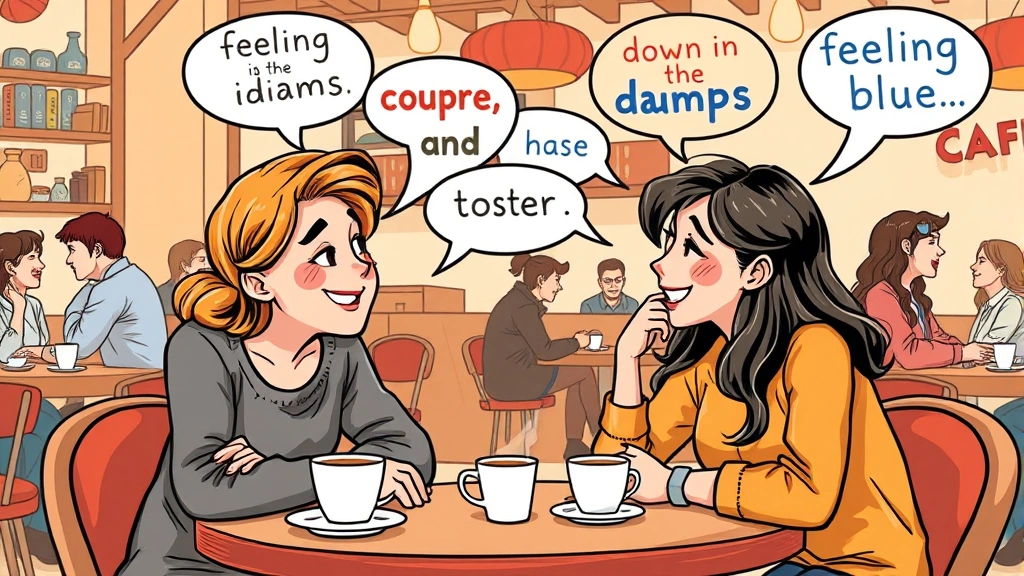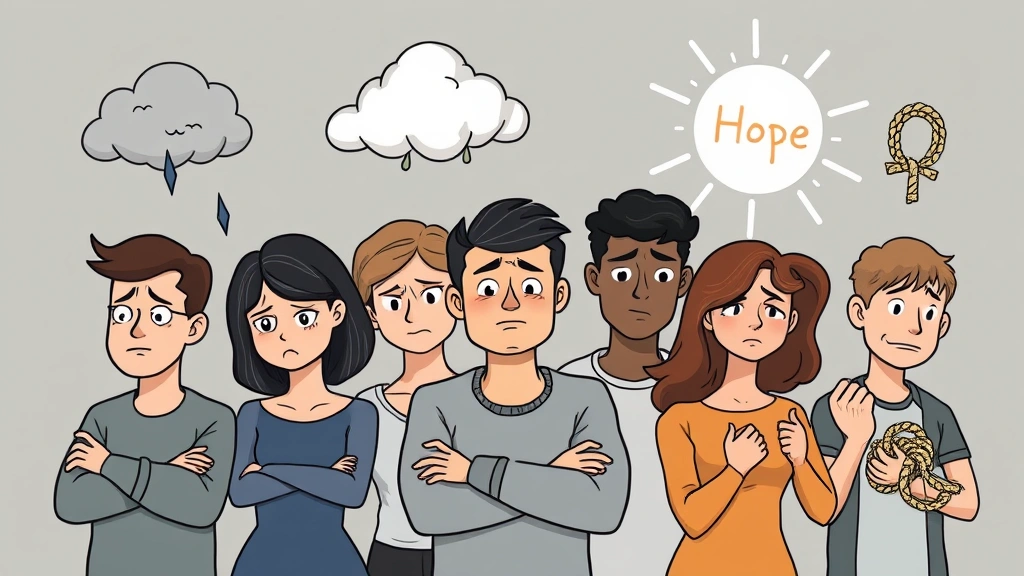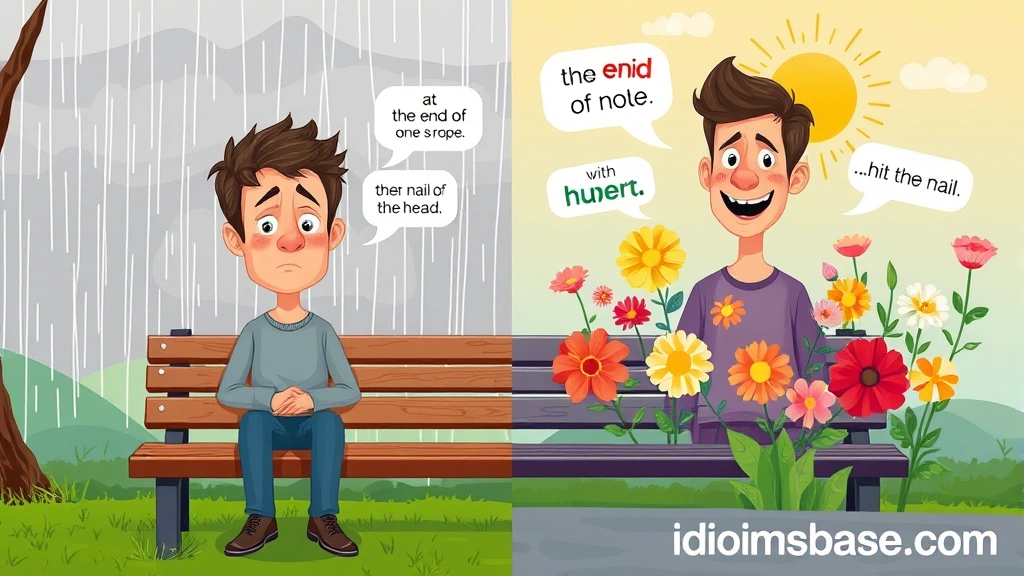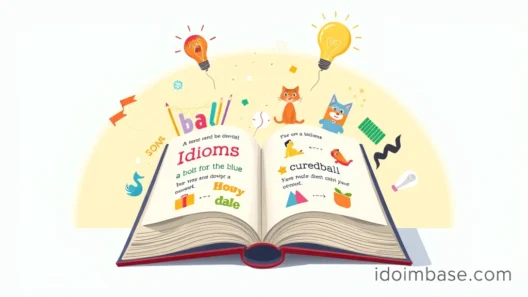Feeling a bit out of sorts? Has something got your goat, or are you just feeling down in the dumps? We all experience moments when emotions bubble up, sometimes making us feel a little less than sunny. And guess what? The English language, in all its quirky glory, has a fantastic array of idioms to help us express these very feelings!
Idioms are those fascinating phrases where the meaning isn't obvious from the individual words. They're like secret codes that native speakers understand instinctively, and learning them can really make your English sound more natural and fluent. So, whether you're feeling blue, seeing red, or just a bit cheesed off, let's dive into some wonderful idioms for upset that you can add to your vocabulary toolkit!
Understanding Upset: Why Idioms Matter
Before we jump into our list, let's chat for a moment about why these colorful expressions are so important. Imagine trying to explain you're "feeling sad" versus saying you're "down in the dumps." The latter paints a much more vivid picture, doesn't it? Idioms add flavor, nuance, and a touch of personality to your conversations. They help you connect with others on a deeper level by conveying not just the emotion, but also its intensity and even the context.
Think of it this way: when you're learning a new language, you're not just learning words; you're learning culture. Idioms are tiny cultural capsules, giving you insight into how native speakers perceive and express their world. Plus, they're super fun to learn and use!
Top Idioms for Feeling Upset
Let's explore some of the most common and expressive idioms used when someone is feeling upset. From mild annoyance to deep sorrow, there's an idiom for almost every shade of discomfort!
Mild Annoyance or Frustration
Sometimes, it's not a full-blown crisis, just a little something that's irking you. These idioms are perfect for those moments.
1. To Get Under Someone's Skin
This idiom means to annoy or irritate someone intensely. Imagine something prickly constantly scratching you – that's the feeling!
- Example: "His constant complaining really started to get under my skin."
- When to use it: When someone's actions or words are persistently bothering you.
2. To Be Cheesed Off
A wonderfully British expression, "to be cheesed off" means to be annoyed or irritated. It's a bit less formal and quite expressive.
- Example: "She was completely cheesed off when her flight was delayed again."
- When to use it: For general annoyance, often about something that feels unfair or inconvenient.
3. To Have a Bee in One's Bonnet
If someone has a bee in their bonnet, they are pre-occupied or obsessed with something, usually to the point of annoyance for others. It implies they're constantly complaining or talking about it.
- Example: "He's had a bee in his bonnet about the new office rules all week."
- When to use it: When someone is persistently bothered by a particular issue and keeps bringing it up.
4. To Get on Someone's Nerves
Similar to "get under someone's skin," this idiom means to irritate or annoy someone. It suggests a slow, steady erosion of patience.

- Example: "The loud music from next door is really getting on my nerves."
- When to use it: When something or someone is consistently irritating you.
Moderate Displeasure or Anger
When the upset feeling intensifies, these idioms come in handy.
1. To See Red
This idiom describes a sudden, intense feeling of anger, so strong that it might cloud your judgment. Imagine your vision literally turning red with rage!
- Example: "When he realized his car had been scratched, he just saw red."
- When to use it: For moments of intense, explosive anger.
2. To Blow a Fuse / To Blow One's Top
Both of these idioms mean to suddenly lose your temper in a spectacular way, much like an electrical fuse overloads or a volcano erupts.
- Example: "When I told him I'd accidentally deleted his work, he nearly blew a fuse."
- When to use it: For a sudden, dramatic outburst of anger.
3. To Get One's Knickers in a Twist (British English)
This is a playful, informal, and distinctly British idiom meaning to get overly upset or agitated about something trivial.
- Example: "Don't get your knickers in a twist over a spilled coffee, it's just a small stain!"
- When to use it: To tell someone not to overreact to something minor.
4. To Have a Chip on One's Shoulder
This idiom means to harbor a lingering resentment or grievance, often leading to a defiant or quarrelsome attitude. It suggests carrying a burden of past wrongs.
- Example: "Ever since he didn't get the promotion, he's had a chip on his shoulder."
- When to use it: When someone is acting resentful or easily offended due to past perceived injustices.
Deep Sadness or Disappointment

Sometimes, upset manifests as deep sorrow or profound disappointment.
1. To Feel Blue / To Be Blue
This is a classic idiom for feeling sad or melancholy. The color blue has long been associated with sadness in English culture.
- Example: "She's been feeling blue ever since her pet cat passed away."
- When to use it: For general sadness, mild depression, or a low mood.
2. To Be Down in the Dumps
This idiom means to be very sad, depressed, or unhappy. "Dumps" here refers to a state of low spirits.
- Example: "He's been down in the dumps since he lost his job."
- When to use it: For a prolonged period of sadness or low spirits.
3. To Have a Heavy Heart
This idiom describes a feeling of profound sadness or grief, as if one's heart is literally weighed down by sorrow.
- Example: "With a heavy heart, she packed her bags and left her childhood home."
- When to use it: For deep, significant sadness, often related to loss or difficult goodbyes.
4. To Be Sick to One's Stomach
While it can literally mean nausea, idiomatically, this phrase expresses extreme disgust, shock, or deep emotional distress, often about something morally wrong or deeply upsetting.
- Example: "The news report about the injustice made me sick to my stomach."
- When to use it: When something is so appalling or upsetting it causes a physical sensation of illness.
Table: Quick Reference for Idioms and Their Intensity
| Idiom | Meaning (Upset Level) | Example Usage |
|---|---|---|
| To Get Under Someone's Skin | Mild Annoyance | His loud chewing really gets under my skin. |
| To Be Cheesed Off | Mild to Moderate Annoyance | I was cheesed off when they cancelled the show. |
| To Have a Bee in One's Bonnet | Persistent Annoyance/Obsession | She's got a bee in her bonnet about the messy kitchen. |
| To Get on Someone's Nerves | Mild to Moderate Irritation | The constant tapping is getting on my nerves. |
| To See Red | Intense Anger, Loss of Temper | When he insulted her, she saw red. |
| To Blow a Fuse/One's Top | Sudden, Explosive Anger | He blew his top when he found out about the lie. |
| Get One's Knickers in a Twist | Overly Upset/Agitated (often trivial) | Don't get your knickers in a twist; it's just a game. |
| To Have a Chip on One's Shoulder | Lingering Resentment/Bitterness | He's had a chip on his shoulder since not getting the promotion. |
| To Feel Blue | Sadness, Melancholy | I'm feeling a bit blue today. |
| To Be Down in the Dumps | Deep Sadness, Depression | She's been down in the dumps since the breakup. |
| To Have a Heavy Heart | Profound Sadness, Grief | She left with a heavy heart. |
| To Be Sick to One's Stomach | Extreme Disgust, Deep Emotional Distress | The cruelty of the act made me sick to my stomach. |
How to Use Idioms Naturally

Learning idioms is one thing; using them smoothly in conversation is another! Here are a few tips to help you integrate these expressions into your everyday English:
- Listen Actively: Pay attention to how native speakers use these idioms. Context is key!
- Start Small: Don't try to use too many new idioms at once. Pick one or two that resonate with you and practice them.
- Don't Force It: Idioms should sound natural. If it doesn't fit the conversation, don't try to squeeze it in.
- Practice, Practice, Practice: The more you use them, the more comfortable you'll become. Try writing them in sentences, or even talking to yourself!
- Be Aware of Nuance: Some idioms are more formal or informal than others. For example, "cheesed off" is quite casual.
FAQ: Your Questions About Idioms for Upset Answered
You've got questions, and we've got answers! Let's clear up some common curiosities about these expressive phrases.
h4. What exactly is an idiom?
An idiom is a phrase or expression where the meaning cannot be understood from the ordinary meanings of its individual words. For example, "kick the bucket" means to die, not literally to kick a bucket. They are figurative expressions, often deeply rooted in culture and history.
h4. Why are idioms important to learn?
Idioms are crucial for several reasons:
- Naturalness: They make your English sound more authentic and native-like.
- Understanding: They help you comprehend native speakers, as idioms are very common in everyday conversation, movies, and books.
- Expressiveness: They allow you to convey complex emotions and situations more vividly and concisely.
- Cultural Insight: They offer a window into the culture and history of English-speaking countries.
h4. Are idioms always informal?
Not always, but many idioms are. Some, like "feel blue," are widely accepted in both formal and informal contexts. Others, like "get your knickers in a twist," are distinctly informal and best used with friends or in casual settings. It's always good to be aware of the context.
h4. Can I create my own idioms?
While new expressions and slang emerge all the time, true idioms evolve over long periods and are adopted by a language community. It's very difficult for an individual to "create" an idiom that gains widespread acceptance. It's better to focus on learning and using existing ones.
h4. How can I remember so many idioms?
Remembering idioms takes time and consistent effort. Here are some tips:
- Contextual Learning: Learn idioms within sentences or short stories, not just as isolated phrases.
- Visualization: Try to create a mental image for each idiom (e.g., "seeing red" as literally seeing red).
- Categorize: Group idioms by theme (e.g., idioms for happiness, idioms for anger).
- Use Flashcards: Write the idiom on one side and its meaning and an example sentence on the other.
- Active Practice: Try to use newly learned idioms in your writing and speaking as often as possible.
- Immersion: Watch English movies and TV shows, listen to podcasts, and read books to see idioms in natural use.
h4. Do idioms for upset vary between different English-speaking countries?
Yes, absolutely! While many idioms are understood globally (like "feel blue"), some are more prevalent or even exclusive to certain regions. For example, "cheesed off" and "get your knickers in a twist" are more common in British English. American English has its own set of unique expressions too. Being aware of these regional differences can help you tailor your language appropriately.
h4. Is it rude to use an idiom incorrectly?
It's usually not rude, but it might sound awkward or confusing. People will generally understand that you're learning. The biggest risk is that you might be misunderstood, or the idiom might lose its intended impact if used out of context. The best approach is to learn them carefully and practice using them accurately.
Key Takeaways
- Idioms are figurative expressions where the meaning isn't literal, adding richness and nuance to the English language.
- Learning idioms for upset helps you express emotions more vividly, from mild annoyance to deep sorrow.
- Common idioms for mild upset include "get under someone's skin," "be cheesed off," and "have a bee in one's bonnet."
- For moderate to intense anger, you might use "see red," "blow a fuse," or "have a chip on one's shoulder."
- When expressing sadness or disappointment, phrases like "feel blue," "be down in the dumps," and "have a heavy heart" are useful.
- Context is crucial when using idioms; some are informal, while others are more widely accepted.
- Consistent practice, active listening, and immersion are key to mastering idioms and using them naturally.
So, the next time you're feeling a bit out of sorts, remember these fantastic idioms. Don't just say you're "sad" or "angry"; dive into the colorful world of English expressions and truly articulate how you're feeling! Which of these idioms resonates most with you? Share your favorite in the comments below, or tell us about a time you felt "sick to your stomach" about something! We'd love to hear your stories and see these idioms in action!






